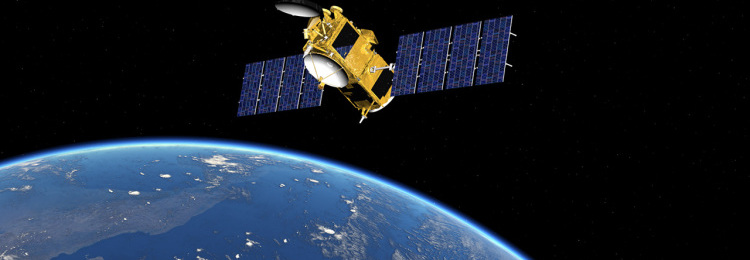EUMETSAT is Europe’s meteorological satellite agency. Its role is to establish and operate meteorological satellites to monitor the weather and climate from space - 24 hours a day, 365 days a year. This information is supplied to the National Meteorological Services of the organisation's Member and Cooperating States in Europe, as well as other users worldwide.
EUMETSAT also operates several Copernicus missions on behalf of the European Union and provide data services to the Copernicus marine and atmospheric services and their users.
As an intergovernmental European Organisation, EUMETSAT has 30 Member States (Austria, Belgium, Bulgaria, Croatia, Czech Republic, Denmark, Estonia, Finland, France, Germany, Greece, Hungary, Iceland, Ireland, Italy, Latvia, Lithuania, Luxembourg, The Netherlands, Norway, Poland, Portugal, Romania, Slovakia, Slovenia, Spain, Sweden, Switzerland, Turkey and the United Kingdom.)
EUMETSAT is now inviting well qualified candidates from its Member States to apply for the following post:
Instrument Engineer Job Description
We are currently looking for an experienced Instrument Engineer to join our international team of young and inspiring engineers and industry professionals, tasked with driving innovation within the Space, Satellite and Earth Observation sector.
This role is routed in EUMETSAT’s commitment to the European Union's Copernicus Earth observation programme and will provide the opportunity to work with leading IT, Space and Earth Observation organisations and domain experts to make a positive impact on society!
BACKGROUND
Copernicus is the European Union's Earth observation programme, coordinated and managed by the European Commission in partnership with the European Space Agency (ESA) and EUMETSAT. Its mission is to deliver high quality, wide range Earth observation services providing information to, among other things, improve the management of the environment, understand and mitigate the effects of climate change, and ensure civil security.
The Instrument Engineer will follow-up the design and development of the optical CO2 monitoring mission (CO2M) instruments, simulators, algorithms and Level 1 ground prototype processors and support the EUMETSAT appropriation of information that is critical to the development of data processing chains and satellite operations – with a particular focus on the CO2 monitoring mission (CO2M).
DUTIES
- Follow-up the evolutions of performance and operability requirements of the CO2M instruments in cooperation with ESA, and support the assessment of compliance with mission and system-level requirements;
- Follow-up the ESA-led design and end-to-end development of the instruments, analyse and assess results of on-ground calibration, testing and qualification and support the assessment of the implications of non-conformances at system and data processing level;
- Follow-up the design and development of the instrument’s simulators, algorithms and Level 1 ground prototype processors, assess their consistency with the instrument design and development and their suitability to support the development of operational Level 1 processing chains;
- Participate in system, satellite and instrument reviews as appropriate;
- In coordination with the ESA and EUMETSAT Mission/Project Scientists co-convening the CO2M Mission Advisory Group (MAG):
- Attend MAG meetings as an observer and contribute to agreed actions;
- Support the definition of requirements for calibration, commissioning and validation of Level 1 products;
- Support the definition of a joint ESA-EUMETSAT calibration and validation plan, and the identification of respective and shared contributions and of those required from third parties;
- Assess the need and define requirements for additional tools needed for calibration, commissioning and validation of Level 1 products, and follow-up and support the development of agreed tools;
- Follow-up the ESA-led assessment of in-orbit performances of the instruments during Satellite In Orbit Validation Tests;
- Support commissioning of instruments and end-to-end operability and performance validation;
- Support commissioning Level 1 products and the implementation of the calibration-validation plan;
- Support reporting to EUMETSAT Member States.
Instrument Engineer Job Requirements
SKILLS AND EXPERIENCE
- Engineering experience in the design and development of optical observation or space science instrument chains, including derivation of algorithm for instrument data processing;
- Experience with grating spectrometers in the visible to shortwave infrared range would be a distinct advantage
- Excellent team working, communication and presentation skills
- Pro-active attitude and the ability to work autonomously with a minimum of supervision
QUALIFICATIONSUniversity degree or equivalent in a relevant discipline (e.g. Physics or Engineering)
Instrument Engineer Application Information
EMPLOYMENT CONDITIONS
- Excellent salary, of up to Euro 6,500 NET (after tax) monthly based on skills and experience
- Flexible working time including additional flexi-leave
- Full medical coverage for employee and family
- Attractive pension
- 30 days of annual leave + 14.5 days public holidays
- Training and development support
- Relocation allowance and support (if applicable)
DEADLINE: 18 December 2019EUMETSAT is committed to providing an equal opportunities work environment for men and women.Please note that only nationals of EUMETSAT Member States may apply. The EUMETSAT Convention requires that Staff shall be recruited on the basis of their qualifications, account being taken of the international character of EUMETSAT. Please apply with your CV and cover letter by the 'apply' button belowRemember - you found this opportunity on Qreer.com
Instrument Engineer Summary
| Education Backgrounds: |
Environmental Engineering
Physics
Software Engineering
|
| Specialties: |
Algorithms
Big Data
Precision Engineering
Signal Processing
Telecommunications
|
| Education Level: |
Undergraduate (Bachelors)
|
| Experience: |
2 - 5 years
|
| Languages spoken: |
English
French
|
| Job Location: |
Darmstadt , Germany |
| Keywords: |
computer science engineer, big data, high availability, computer engineering, weather, climate change, instrument engineer, earth observation, optical monitoring, environment, satellite operations |
Apply

